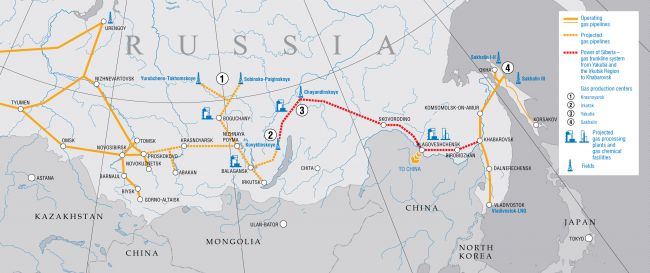The north of China, where the Power of Siberia pipeline is being built, is short of gas. Abnormally cold weather in the region that has lasted since early December forced the regional authorities to start imposing restrictions on gas consumption, and the Ministry of Environmental Protection of China temporarily lifted the ban for thermal power plants on burning coal for heating of residential houses.
According to Xinhua the state news agency, since Saturday, 7.25 million cubic meters of gas is delivered daily from Guangdong province in the south of China to the north of the country. Guangdong Natural Gas Grid Company announced that PetroChina and CNOOC will supply gas volumes that will be enough for 1.5 million households. If necessary, deliveries will increase to 9 million cubic meters per day.
Earlier, according to Reuters, authorities in Hebei Province, surrounding Beijing, introduced an "orange" level. This means that there is a 10-20% gas deficit in the main steel industry region. Therefore, the regional authorities restricted gas consumption to commercial and industrial enterprises. Also, according to South China Morning Post, abnormal colds and gas shortages hit not only the north, but also the center of China. Gas deficit is now experienced in the provinces of Henan and Hunan. In the city of Changsha in Hunan Province, as the Central Television of China reports, gas supply of industrial and commercial enterprises was discontinued, and for ordinary Chinese, who consumed more than 1.500 cubic meters this year a 15-cubic-meter limit was imposed.
In Beijing itself, they started a cogeneration plant, which operates on coal.
As reported by Nasdaq, the situation is aggravated by a sharp increase in gas consumption in China this year. For 10 months, it was 43% and is explained by the government's program for abandoning coal and switching to natural gas.
The sharp increase in gas consumption in China has led to a significant increase in gas prices throughout Asia. In December, they exceeded $355 per thousand cubic meters.
Deputy Director of the National Energy Security Fund (NESF) Alexei Grivach believes that the gas deficit in the northeast of China, including Beijing area, will be solved by the construction of the Power of Siberia gas pipeline with a capacity of 38 billion cubic meters per year. "For China, this is obvious. In the north-east of the country, there is almost no gas now. The Power of Siberia will make it possible to reduce the dominance of coal in these provinces of the PRC and at least assuage the severity of the environmental problem turned into a catastrophe with each heating season," the expert said. According to him, in the central regions of the country (north of the Yangtze River), the gas deficit is due to the lack of sufficient infrastructure for underground gas storage: "Therefore, it is very difficult to handle the surges due to sudden temperature fluctuations."

 UAVs of the Armed Forces of Ukraine attacked the Grozny-City high-rise complex in the capital of Chechnya
UAVs of the Armed Forces of Ukraine attacked the Grozny-City high-rise complex in the capital of Chechnya Hindi rus bhai bhai, Olena and the Epstein case, Uusitalo tired: morning coffee with EADaily
Hindi rus bhai bhai, Olena and the Epstein case, Uusitalo tired: morning coffee with EADaily Explosions thundered in Kiev
Explosions thundered in Kiev Russia will not stand on ceremony with Europe, as with Ukraine — Doctorow translated Putin
Russia will not stand on ceremony with Europe, as with Ukraine — Doctorow translated Putin Zelensky is in danger: Spiegel published a transcript of the conversation between Macron and Co.
Zelensky is in danger: Spiegel published a transcript of the conversation between Macron and Co. Stubb frankly stated how on Ukraine will "digest" the settlement of the conflict
Stubb frankly stated how on Ukraine will "digest" the settlement of the conflict